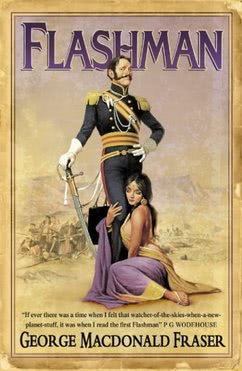Harry Flashman

| This article is probably off-topic, but tolerated because it's relevant and/or popular on /tg/... or we just can't be bothered to delete it. |
Sir Harry Paget Flashman is The Man.
Author George MacDonald Fraser done outright stole Flashman from Thomas Hughes' Tom Brown's School Days, a book from 1857 you probably didn't read but a lot of Brits did in the 1960s. For Hughes, Flashy was a coward and a bully, expelled for drunkenness; Fraser spun out his career after that. Yes it's fan-fiction. No it's actually good.
"Harry Paget" wasn't what Hughes had named him. That name came from the cad who'd straight-up sent the Duke Of Wellington's brother to the cuckshed. Under Fraser's hand Flashman will blossom into an adventurer despite himself over... well, over EVERYWHERE.
The first Flashman was pretty much a satire of Victorian heroic fiction about the Northwest Frontier, tracking hard with Rudyard Kipling. In that book, Flashman was a close and acidic observer of the First Afghan War, describing in detail how his superiors lost the country and got a British army wiped out. Flashy himself survived with a completely undeserved reputation for heroism (and became, in fiction, the 2nd English survivor of the Kabul Retreat). Over fifty years of novels Flashman will show up in almost every major world event from the fall of British Afghanistan in the 1840s to Custer's Last Stand in 1876. Usually with his pantaloons spattered with dysentery as he tries to get far far away.
One notable hole in Flashman's biography is the American Civil War. While Fraser established early on that Flashy served with distinction -- on both sides of the conflict -- he never got around to writing down the details. Late in his life, Fraser confessed this was because he (and Flashman) considered the war a rather boring sideshow to the period's more Anglo-centric wars, like the Crimea. This didn't stop Flashman from going on plenty of American adventures, though, from participating in the (illegal) slave trade, joining the 1849 gold rush (with a wagon train of whores), getting adopted by the Apaches, inspiring Uncle Tom's Cabin (and getting saved from execution by Abraham Lincoln in the process), and participating in John Brown's raid on Harper's Ferry.
Fraser sold some film rights, which didn't happen, but he pocketed the cash. Then he sold more film rights to the sequel Royal Flash which did happen, in 1976. Fraser spent a lot of time in the Isle of Man swimming in massive piles of British sterling like Scrooge MacDuck (this was a common tax dodge for wealthy Britons of the time).
Fraser may actually be better-known outside /tg/ circles for being a screenwriter. He wrote the script for the James Bond film Octopussy -- big whoop -- but he also penned Richard Lester's Three Musketeer films, which are well worth seeing if you haven't already.
As for why /tg/ cares - Flashy ranges over settings and gets into scrapes - mostly historical - you'd barely believe ever existed or happened, but they did. Sandy Mitchell based his Ciaphas Cain on this template (with a touch of Blackadder) in the Warhammer 40000 setting.
Seriously, if you haven't read Flashy, why the fuck are you even here. Get off this site and get started on it.
Side note: Due to what period it's satirizing, do expect to read things you'd expect to see on /pol/. It's to be expected, given that colonialism was in full swing around then. Flashman comes off (mostly) as an equal-opportunity offender -- he has a low opinion of the locals he encounters, but his opinion of most Englishmen and Europeans is little better.